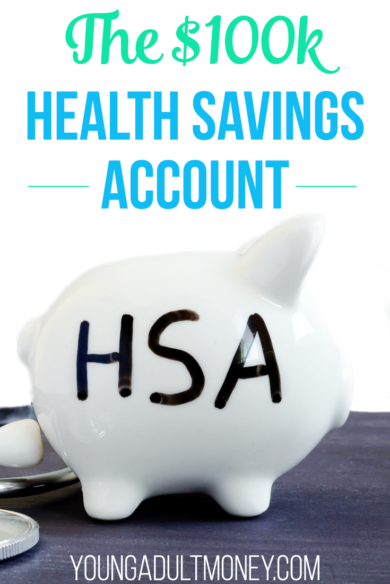 At some point I become obsessed with the idea of having $100k in a Health Savings Account.
At some point I become obsessed with the idea of having $100k in a Health Savings Account.
Obsessed may be the wrong word because it’s something I have very little control over.
But I still think it would be pretty cool to have $100k in an HSA.
For 2019 the maximum HSA contribution for an individual is $3,500 and for a family is $7,000. If you are 55+ at any point in 2019 you can contribute an extra $1,000.
With how expensive health care is today, it wouldn’t be unheard of for an individual to spend $3,500 in a year, or a family to spend $7,000 in a year, on medical expenses.
But to get to the coveted $100k in your HSA you would need to deposit more than you spend, and it takes just one illness with crazy high prescription drug costs, or a surgery, or an overnight at a hospital, to spend $3.5k or $7k on medical expenses in a given year. And if you spend everything you put into an HSA, you won’t be able to continue to build the balance.
But let me take a step back and explain what an HSA is and why I love maxing it out each year.
How an HSA Works
If you have a high deductible health plan (HDHP), you can take advantage of an HSA. HDHPs are becoming common for a variety of reasons. First, they come with lower monthly premiums, which consumers react positively to. Second, health insurers believe that when a consumer is responsible for their medical expenses they are more “price conscious” and potentially even shop around.
This logic holds true in some cases, but certainly not all. If you are facing an emergency situation you likely aren’t going to think twice about going to the ER or not. Unfortunately HDHPs may cause people to not seek necessary care because they are responsible for thousands of dollars of medical expenses before their insurance starts covering a portion.
Regardless of the pros and cons of HDHPs, they are here to stay and will likely only become more common over time.
If you are stuck with an HDHP, you should be taking advantage of an HSA for two big reasons: medical emergency fund and tax benefits.
Medical Emergency Fund
It’s not uncommon for a HDHP to have a deductible as high as $6,000. The problem is that according to a 2018 report from the Federal Reserve Board, 4 out of 10 Americans do not have cash on hand to cover a $400 emergency without borrowing or selling something.
But some (most?) medical costs are unexpected, and with a HDHP you could be on the hook for thousands of dollars from a single unexpected medical episode.
That’s why it’s important to establish a medical emergency fund. This at least to a certain extent takes money out of the decision whether to pursue care. Thankfully an HSA gives you tax advantages to give you an incentive to build a medical emergency fund.
Tax Advantages of an HSA
HSAs have what many refer to as a “triple tax advantage.” This is because of the following tax benefits:
- Put Money in Tax Free – As mentioned earlier, you can contribute up to $3,500 as an individual or $7,000 as a family per year into an HSA. If you are 55+ at any point in 2019 you can contribute an extra $1,000. Those contributions are pre-tax dollars, meaning it shields those contributions from being factored into your taxes.
- Grow Money Tax Free – With an HSA you are typically required to keep somewhere around $2,000 as a cash balance. Once you get past that minimum benchmark, though, you can move money into the investment portion of your HSA. Similar to a 401(k) or an IRA, there will be a variety of mutual funds you can invest in. The gains on these investments are tax free, and you can shift the money back into the cash portion of your HSA at any time.
- Take Money out Tax Free – When you withdraw funds from your HSA for qualified medical expenses (think prescriptions, doctor bills, etc.) you are not taxed on the withdrawal. If you withdraw money for non-qualified medical expenses, the amount will be taxed as regular income and incur a 20% penalty.
As you can see, contributions to your HSA (up to the annual limit) are tax-free, investment gains within the account are tax-free, and you can take money out tax-free for eligible medical expenses.
But there is one additional aspect of an HSA that doesn’t get enough mention: No withdrawals from an HSA after age 65 are penalized, though withdrawals for non-qualified medical expenses are taxed as regular income.
It has the same benefits after age 65 as other tax-deferred retirement accounts like a 401(k) or 403(b), as you are able to withdraw funds and have them be taxed as regular income. But it also offers the continued extra benefit of allowing tax-free withdrawals when used for qualified medical expenses.
While many in their 20s and 30s aren’t thinking about their finances when they are in their 60s, 70s, and beyond, it doesn’t take a health industry expert to predict that health care costs will be high in old age. Building up your HSA now could set you up very nicely in your retirement years.
Because of the investment benefits, it oftentimes makes sense to contribute to an HSA even if you are “healthy” and rarely have medical costs. The quicker you can build up a sizable balance in an HSA, the sooner you can get money into investments, and the sooner those investments can build.
Worst case scenario you withdraw funds from
The $100k HSA
Between the two of us my wife and I had three surgeries over the course of three years, resulting in high medical bills. Thankfully since that time we have had lower medical costs.
While there are some planned big costs on the horizon such as Lasik and pregnancies, as long as the costs remain low and we continue to max out our HSA year-after-year we will be slowly but surely on our way to a $100k HSA.
What about you? If you have access to an HSA, have you started to sock away money? Why or why not?


I love HSAs and make sure it is my first account that is maxed out. I recently switched mine to fidelity which has no fees and no minimums so you can invest the entire balance. Nowadays even “low” deductible plans can have pretty high deductibles still, so going with a HDHP and utilizing an HSA is usually a smart idea
I actually didn’t know Fidelity had an HSA! With ours being a minimum of ~$2k, it is a bit of a bummer to have to leave that much cash in it since it’s so easy to shift investments back to the savings portion. I could switch but our HSA is very integrated into other things like our biometric screening / health rewards, so it’s just easier to keep it where it is.
I don’t have access to an HSA but wish I could for the tax benefits. As a self-pay family with two different unplanned medical visits in the same month, having an HSA helps “force” you to set aside cash for inevitable medical expenses.
I think the $100k goal is laudable and helps provide a healthy cushion for later in life.
Yeah the trend towards high deductible health plans worries me in the sense that many do not even have enough in their primary emergency, let alone a secondary “medical” emergency fund. You really need some sort of cash cushion to avoid going into debt when a medical emergency happens.
HSA is a very interesting option and I am sure I will go into this. Thanks for this great overview!